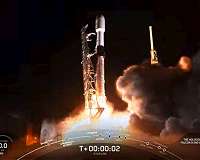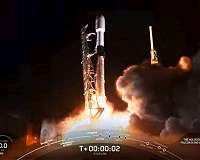The thesis is concentrated on the research of techniques that reduce the noise level of space rockets during the initial stages of launching (engine ignition and takeoff). Based on Ivan Herrero, at these times, the levels of strain experienced by the space vehicles are incredibly high and might impact the light structures onboard, such as solar panels and antennas, which makes it essential to reduce the noise levels.
It’s the highest level sound event produced by a human being, just behind some organic events like an earthquake,” explains Ivan Herrero.
In addition, the intense sound generated from the principal sources, engine and jet raises due to reflection at the bottom of the rocket launching site, which behaves like a mirror from the acoustic point of view, and provides the energy discharged back to the rocket as well as the structures onboard, implying economic and safety consequences.
Prototype
The prototype made by Ivan Herrero, under the oversight of his thesis supervisors, is based on a range of Helmholtz resonators, which maximizes the absorption and diffusion, to mitigate the sound pressure levels.
“The existence of Helmholtz resonators, in addition to their particular supply, produces a decrease in the speed of sound diffusion. This is because of the friction of waves using the resonator walls, which produces a deceleration. The design of the system was performed by maximizing a particular frequency range, which they have been able to reduce by an average of 20 decibels,” explains Ivan Herrero.
Despite the significance of this problem, knowledge regarding the steps, the behavior of the ground installations about the diffusion and absorption, along with the features of the sources continue to be poor. The research work created at the Gandia campus of UPV and the European Space Agency is in reaction to this requirement.
NPI PROGRAM
Ivan Herrero has grown a part of his research work in the specialized centre of the European Space Agency (ESA) in Holland, thanks to this arrangement signed between UPV and ESA within the Networking / Partnering Initiative (NPI) system, in which many universities and research institutes in advanced technologies are engaging with potential space programs.
– Advertisement –


